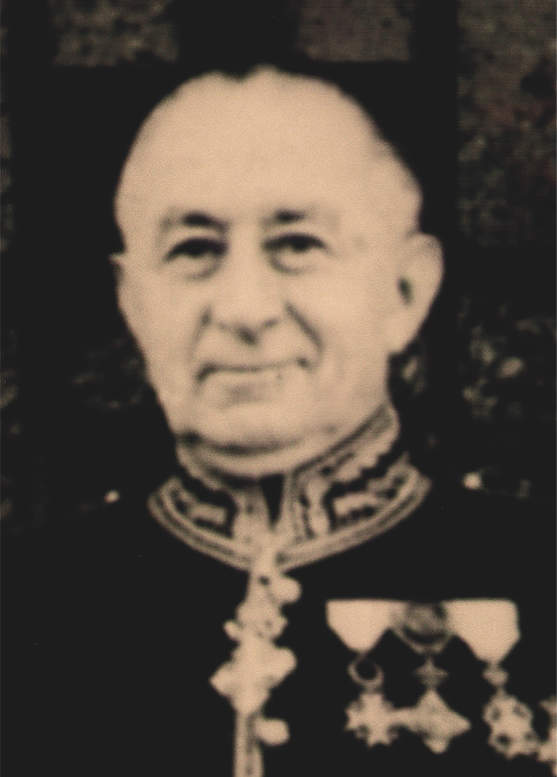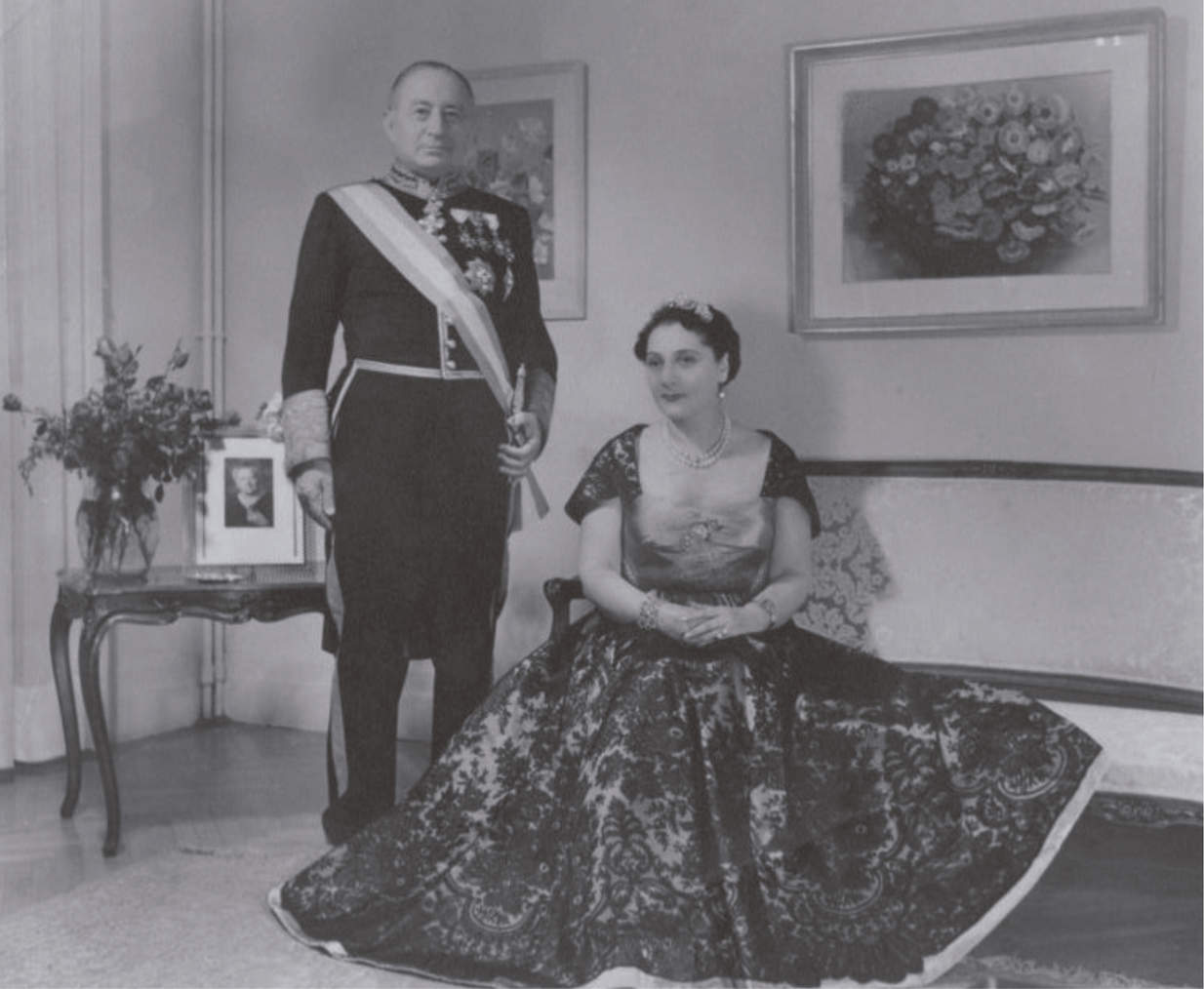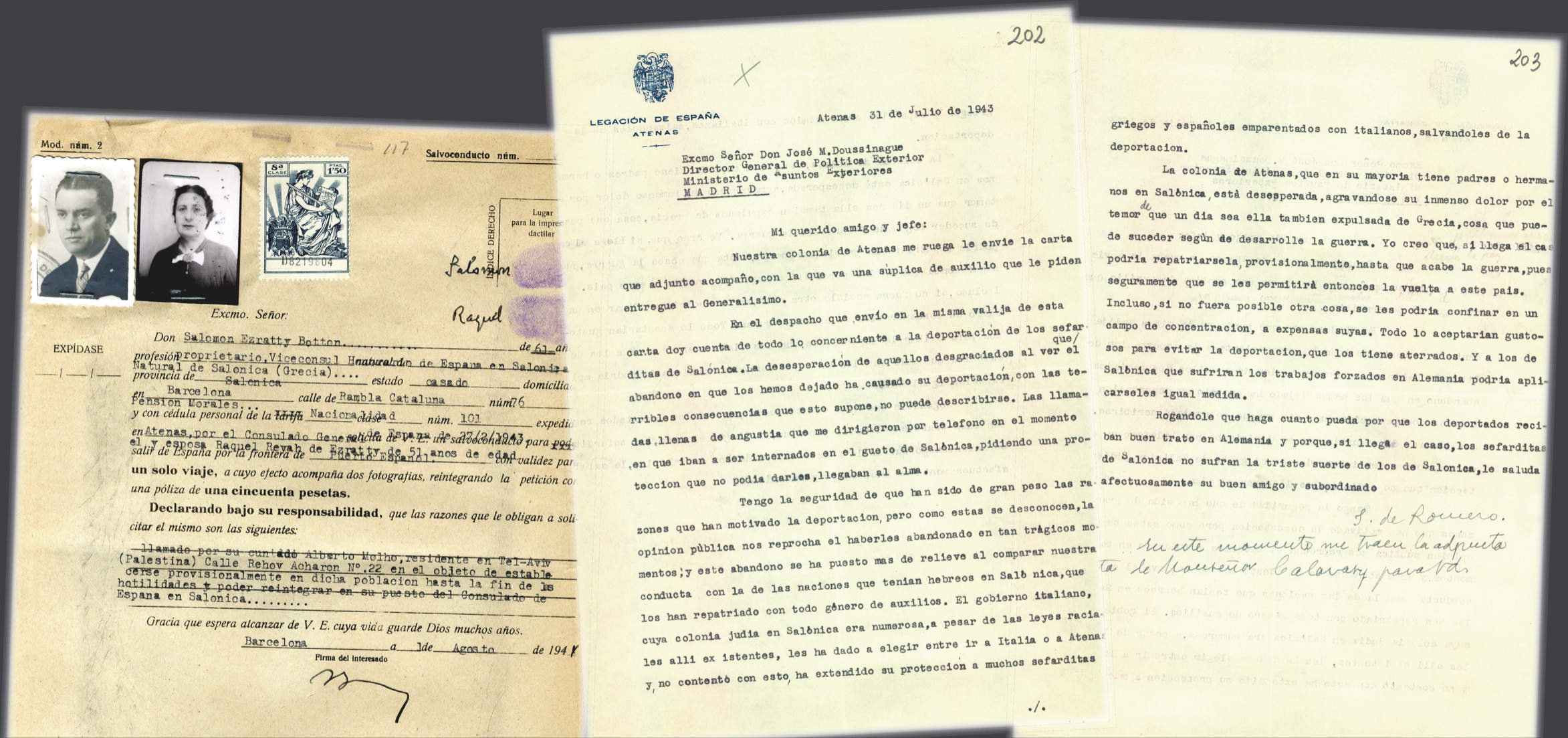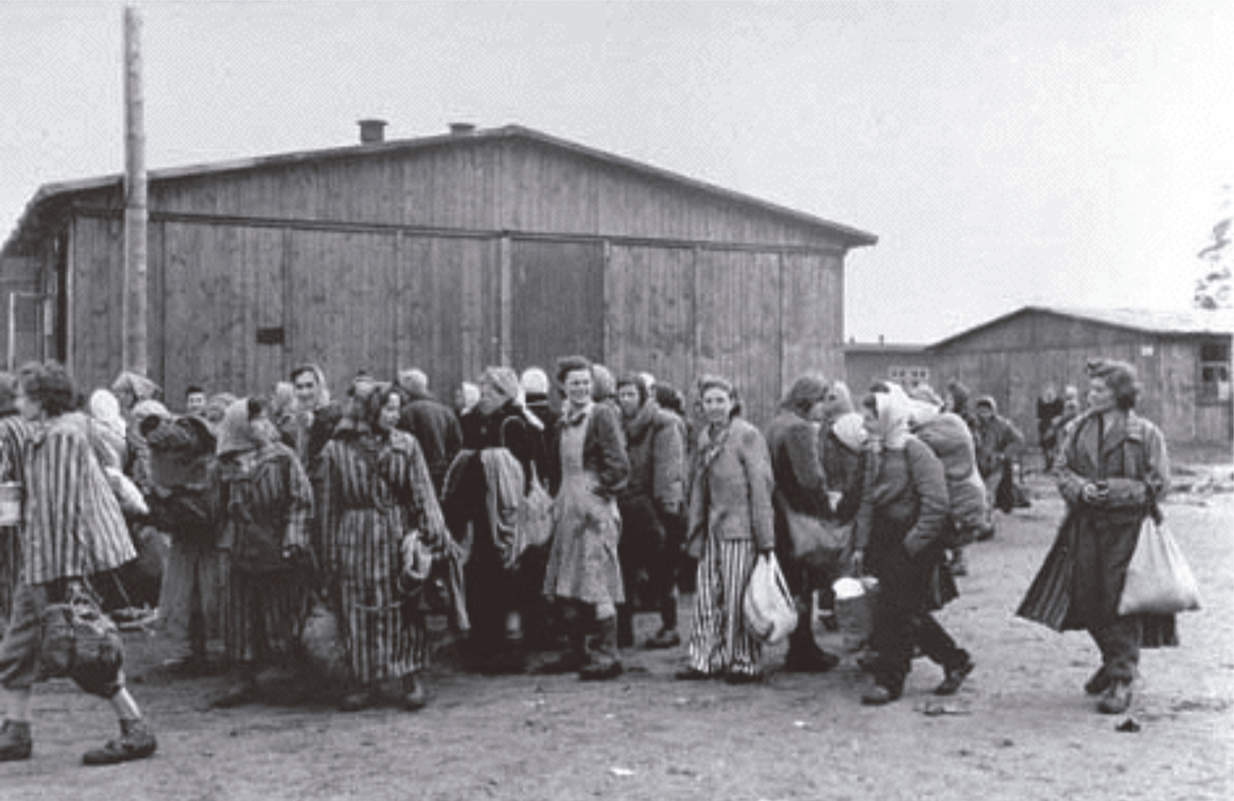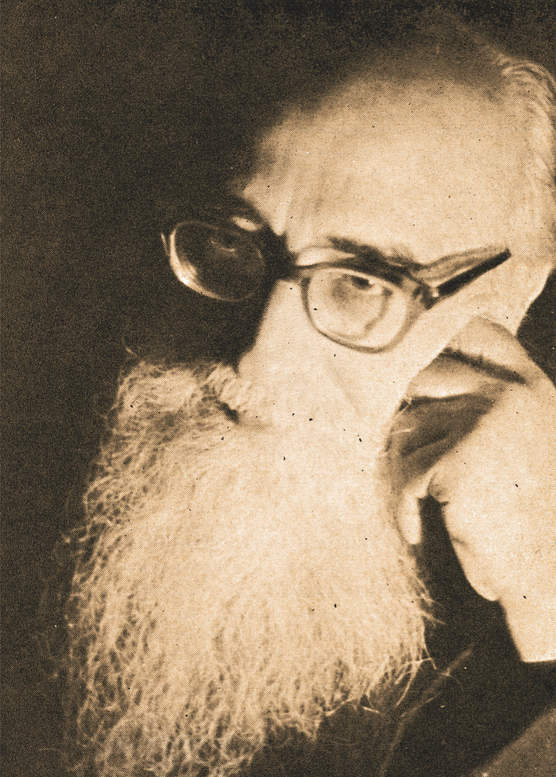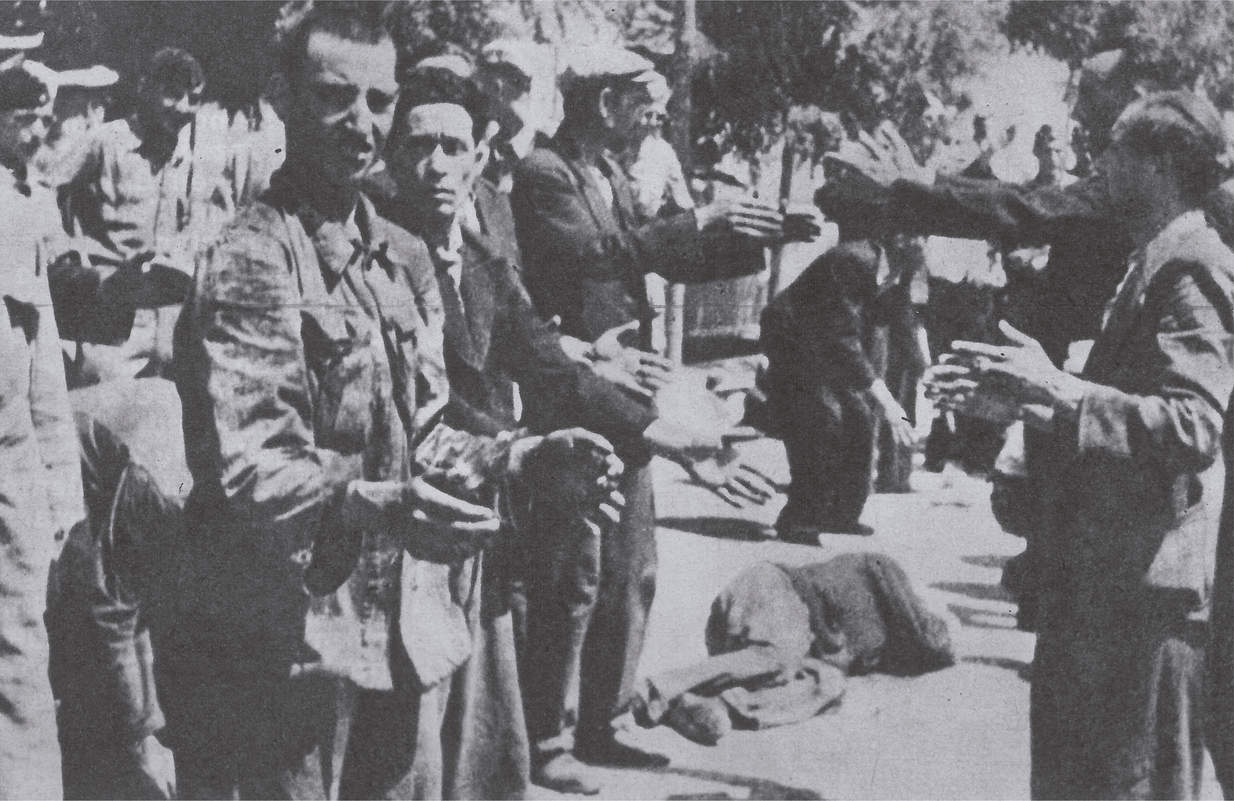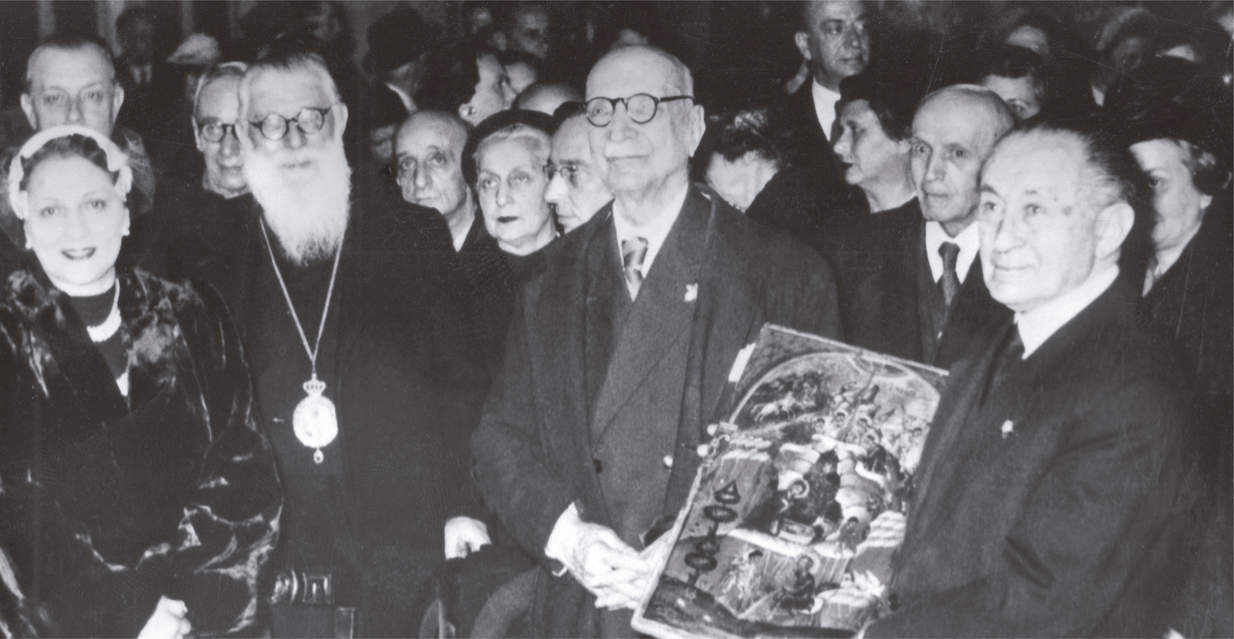CONSUL GENERAL (ATHENS, 1943-1945)

SEBASTIAN ROMERO RADIGALES
Stopping the deportations
Sebastián Romero Radigales (1884-1970) had close ties to Greece because of the Greek origin of the family of his wife, Elena Cutava Animo. While visiting them in Athens, on 18 July 1936 he was appointed official agent of the National Government in Greece. He would hold that position during the entire Spanish Civil War. Ideologically he was a conservative, and had a brother who was a Member of Parliament for the Agrarian Party and Under-Secretary of the Ministry of Agriculture during Spain's Second Republic.
A religious man, with deep Catholic convictions, Radigales became acquainted with the Jewish world during his first diplomatic postings: Larache (Morocco), Tangier (Morocco), Belgrade (Yugoslavia) and Galati (Romania). During a previous stay in Athens he had had close ties with the local Sephardic colony, but during his posting to Sofia (between 1939 and 1940) he was confronted by a cruel anti-Semitic policy, and initiated procedures to revoke the first expulsion orders targeting the Spanish community.
On 9 April 1943 he took up the post of Consul in Athens, coinciding with the German ultimatum to deport Jews from Salonika. Faced with this tragic situation, he tirelessly sought to convince Madrid to repatriate its Sephardic nationals.
Despite receiving a refusal from his Ministry, together with explicit instructions to maintain "a passive attitude and not carry out personal initiatives", Radigales contacted other foreign diplomats seeking to prevent deportations. His efforts did not succeed in preventing the deportation of the 367 Spanish Jews of Salonika to Bergen-Belsen in early August 1943. However, he did intervene repeatedly to ensure "good treatment" during their trip to and stay at the concentration camp, and, later, to enable their evacuation to Spain.
Previously — in collaboration with the Italian consul, unbeknownst to the Germans, and without authorization from Madrid — he helped some 150 Spanish Sephardim from Salonika escape to Athens on an Italian military train. Moreover, through his mediation, the Italians extended their protection to dozens of Spanish Jews with Italian or Greek spouses.
Following the occupation of the Greek capital by German troops on 9 September 1943, he immediately warned his superiors that the fate of the Spanish Jews in Athens would undoubtedly be as tragic as that of their brethren in Salonika. He begged Spain to urgently repatriate them, expressing his own personal anguish.
Radigales's tireless efforts to convince his Ministry to reach an agreement with the German government were finally rewarded, because six and a half months after their deportation from Salonika, in February 1944, the 365 survivors of the group that had been interned in Bergen-Belsen were liberated and taken to Spain.
But joy over this repatriation was short-lived. Since there was no acceptance from Madrid, on 2 April 1944 the Nazis deported another group: 155 Sephardic Jews arrested in Athens were interned in the Haidari camp. As proof of their Christian charity, Radigales and his wife visited them often to alleviate their pain; they also sent them a lorry full of food and provisions. The Consul interceded with the Germans to prevent the elderly, the ill and the children from taking that inhuman journey, but his pleas fell on deaf ears.
Between July and September 1944, Radigales took it upon himself to assist and protect a group of some 80 Spanish and Greek Jews who had escaped deportation by hiding in Athens. He sheltered some of them, without informing Madrid, in a hotel near the Legation, which he had granted extraterritorial status. His wife, Elena, even sheltered for a few weeks, in her own residence, the elderly father of 'no Gattegno and later, thanks to Father Typaldos, found him a safe haven.
Despite Radigales's insistent efforts to achieve the liberation of Athens's Spanish Jews, this did not take place until the arrival of British troops at Bergen-Belsen on 13 April 1945.
The diplomat stayed in Athens until his retirement in 1954, after 11 uninterrupted years there, which is extraordinary for a diplomatic career. When the status of the Legation was raised, he was deservedly named Ambassador. He died at the age of 86 in Madrid.
On 26 February 2014, Yad Vashem recognized Sebastián Romero Radigales as Righteous among the Nations.
СHANCELLOR (ATHENS, 1942-1944)

FATHER IRENEO TYPALDOS
" Papaziko will work for your freedom"
A priest of the Greek Byzantine Catholic Church, born in Patras, Father Ricardo Ireneo Typaldos (1898-1973) played a heroic role during the detention of Salonika's Sephardim in July 1943: a dozen Jews with Spanish and Greek nationalities owe their lives to him, as he prevented their deportation in Athens, providing them with shelter, a hiding place and documents of protection.
Pateras ("father" in Greek), as he was affectionately known by his colleagues, worked for the Spanish Embassy in Greece for 34 years, from 1937 until his retirement in 1971, first as a translator and, af-ter 1942, as Chancellor.
Under the orders of Sebastián Romero Radigales, then - Consul General, Typaldos made three trips to Salonika to "comfort and give strength to the group of 367 detained Spanish Jews". On 31 July 1943 he tried to convince the German authorities to delay their deportation until a clear defence arrived from Madrid. If that were not possible, he begged them to at least exempt the children and elderly from deportation. His efforts proving to be futile, he then insistently asked the Gestapo commander Wisly Tscheny to allow him, as representative of the Consul of Spain in Athens, to accompany the convoy to the Bergen-Belsen concentration camp. In the end, the Germans only allowed the Spanish Jews to travel in better conditions than the Greek Jews.
Especially admirable was Typaldos's courage in carrying cash and valuables belonging to Spanish citizens that had been seized upon their arrest. They were handed over to him by the Spanish Vice-Consul in Salonika, Salomon Ezratty Botton. Thus, he personally took to Athens three large suitcases carrying more than 80 kilos of jewellery and gold, which he organized into personal numbered and sealed packages, each with the names of their owners and a list of their contents. On his third trip, he took 22 million drachmas, 40,000 dollars and 50,000 Swiss francs. All of this was later held by the Consulate in Athens and by Spiliakos, the attorney of the Spanish colony, in order to be returned in full to their owners after the war.
In Athens, when church leaders asked the population to shelter the persecuted, Typaldos joined this effort and sought safe havens for Jews. He was especially concerned about the children.
As the administrative director as the Greek Catholic orphanage of Athens, under his own responsibility and risking his life, he gave a hiding place and food to the two sons of Emmanuel and Rachel Saltiel Cohen: Salomon (hiding under the name of Nikos), aged 14, and Sergio (under the name of Theodore), aged 5. Moreover, he sheltered the Ben-Sasson family in his house. When the threat of German searches intensified, he found them new trusted homes, protecting and feeding them until the country's liberation.
Father Typaldos was also resolute in using his status as Chancellor of the Consulate of Spain in order to provide identity documents to persecuted people who had lost their Spanish nationality when marrying Greek nationals. This saved their lives.
Accused of hiding Jews, in the spring of 1944 he was held by the Gestapo for a week at their headquarters on Merlin Street, but did not reveal a thing despite the cruelty of their interrogations. With incredible courage, Sebastián Romero Radigales managed to get him freed.
Many years later, some of those saved by Typaldos still had vivid memories of the day in Salonika — where he had gone to comfort them — when he whispered, "Your Papaziko is here". It was a great relief for them to hear him say, "Papaziko will work for your freedom". Surrounded by the infinite gratitude of hundreds of Jews whom he had protected and helped in one way or another, Father Typaldos would only say, "I fulfilled my duty as a man and as a Christian".
In 1958 he was granted the Greek Orthodox title of Archimandrite and, when he retired in November 1971, Spain's Ministry of Foreign Affairs granted him an honourable pension. This enabled him to live comfortably in his religious order until his death in October 1973.
On 8 July 1969, Father Irineo Typaldos was recognized by Yad Vashem as Righteous among the Nations.

 Loading
Loading

